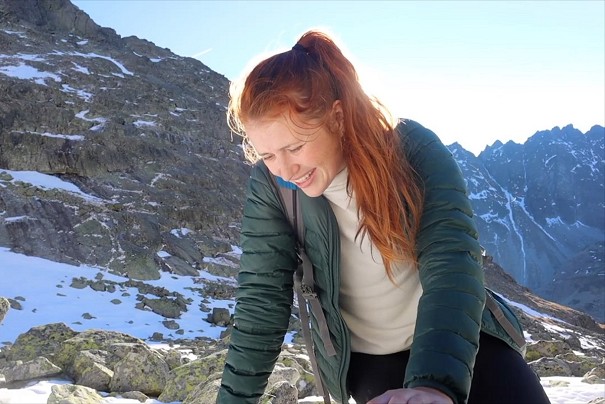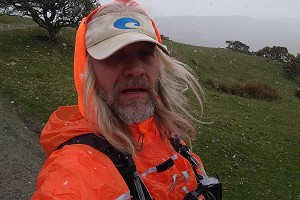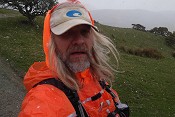
Exercise in nature is one of the most effective ways to maintain good mental health. Why, then, do we tolerate such restrictive access to the countryside in England and Wales? If we want a happier, healthier society, then surely it makes sense to tackle the access issue, says Feargus Cooney.
In the summer of 2022, I found myself alone on a high plateau – the 'Imir Fada' – between the peaks of Conival and Beinn Uidhe. Like many excursions I had made into the hills over the previous several years I didn't feel much like making the effort to get there, because I was in the throes of the longest episode of depression of my life.

I really had to push myself to pack my bags for a three-day excursion and to get out the door. In the midst of clinical depression even getting out of bed can feel like a big challenge, and hiking a mountain can feel almost impossible. I motivated myself and kept focused by shooting photos and video. It wasn't until afterwards when I arrived back home in Ullapool that I noticed I was actually feeling something; something I hadn't felt in years. I felt positive. I felt love for my wife and child. I felt… normal.
You could say I had been suffering from what the author Richard Louv has termed 'nature deficit disorder', or more specifically a long metastasizing malady from having my safe access to nature withdrawn.
Exercise in relatively natural surroundings is at least as effective as antidepressants. Yet 92% of the land in England and Wales is off-limits, and 97% of river mileage is restricted
Compared to most children I grew up in paradise – raised in a big house with nearly an acre of land in the Wicklow Mountains near Ireland's east coast. Although the setting was wonderful, home life was less than rosy. My family had a high level of dysfunction and tempers often flared. As a sensitive kid I was an easy target and was bullied relentlessly in primary school, and to a lesser extent in secondary, and to top things off my father died when I was nine-years old after an all-consuming cancer withered him down before our eyes over the course of nearly two years.
Through all of this though I always had 'the mountain'. The Great Sugarloaf – a modest hill that rose to a height of just over 500m beyond the fence of our garden – was a sanctuary. It was always a safe space to get out and forget about the chaotic issues stewing back at home, and where I wouldn't be judged or bullied. 'The mountain' was full of wonder, with ancient woodlands, large natural ponds and streams full of wildlife, cliffs and boulder fields with all kinds of nooks and crannies between and under them to explore.
As I grew older, I would often go out alone for hours, lost in wonder. I took to camping with friends, and never thought much about whether anyone might take issue with my presence – after all I wasn't hurting anyone or breaking anything. I ventured increasingly into the fields and wider area of the Wicklow Mountains, with no rules or significant boundaries. I very much internalised the concept that land was there for everyone as long as it was respected, and I took it for granted at the time.
By the time I was in my mid-thirties I found myself living in Cornwall. As a young adult I had spent time living in Australia, Germany and Scotland, enjoying the freedom of the wild spaces in all of them as an antidote to grown-up concerns, and a way of delaying grown-up responsibilities. But the relative trauma of my childhood had also come back to haunt me in the form of repeated episodes of depression and chronic stress/anxiety which started in my mid-twenties.
Once I had moved to England these symptoms had become so familiar that they were simply background noise. I somewhat remembered what it was like to feel intense joy or to laugh until my sides hurt, but accepted that those experiences were mostly a thing of the past, and that now I lived in a calmer and more subdued present – able to behaviourally mask the darker feelings from most people. Sometimes it got too much to manage though, and life became something to endure rather than enjoy. The silver lining to these episodes was that I became motivated to grow as a person. I underwent repeated periods of psychotherapy and introspection, gradually discovering who I really was underneath and how vital my time in wild places had been to my limbic system in my early life.
Much later – working on my PhD in evolutionary biology – I discovered just how tightly our early life environment moulds us. Those crucial first years play an enormous role in preparing us for adult life in an environment which resembles the one in which we were raised, with our brains becoming hard-wired to process experiences in adulthood that resemble those we learned to cope with as children. For me that meant that I was tied to the freedom of the hills, streams and forests – the safe spaces I could always rely on when things became too much.
In Cornwall however, I was presented with a situation in which my hard-wiring was maladapted. This was a land filled with a high density of restrictive fencing and angry signs declaring that 'Trespassers Will be Prosecuted' or 'Private Land – No Public Access', far more than I had seen in other places I had lived. Yes, the coastline was lovely, but there was only so much wonder to be found on a beach. Away from the coast the landscape was much tamer and more domesticated than the south of Scotland – from where we had most recently moved. I tried to appreciate it for a while, going on coastal walks or paddling around in the sea when the swell occasionally calmed down enough to allow it. Walking on the inland 'rights of way' felt very restrictive and was a concept I was until then not very familiar with. So I sometimes ignored the signs and went on into the uncultivated areas or paddled down the rivers on my packraft.
Scotland's progressive access laws and wild open landscape have restored my mental safe space
I plodded on through repeated episodes of mild depression and chronic stress – the intensity of which was dampened by the medication I had been taking for years. But I became increasingly disgruntled. I couldn't compute emotionally why things were so restricted. On multiple occasions I was confronted by irate landowners or people fishing, and with so much riding on these outings for managing my frayed nerves I never took it well. My escape-route, my safe space had become a place that the bullies of my youth had conquered – at least that was what it felt like to my limbic system. It would take weeks of rumination after each of those encounters before they would stop being at the forefront of my mind. Try as I might with therapy sessions or mindfulness meditation techniques, whenever I would let my mental guard down and my thoughts go where they wanted I would end up replaying the events of the confrontations over and over in my head, and searching books and the internet for some kind of validation that I wasn't going crazy – that I was justifiably upset about something that was unfair.
But when I would try to communicate my point to friends who had moved here from even more densely populated parts of England I was typically met with blank looks. It was only gradually that I realised that other people who grew up with such restrictions could no longer see the bars on the cage. Those bars were simply a fact of life, too normal to think about. My early life freedom in the wild had morphed from a blessing into a liability, and I became increasingly uncomfortable with deviating from the beaten path. I had been beaten into submission.
The last decade has seen an explosion in research into the relationship between mental health and time spent in wild areas. Whether or not someone grows up with a close connection to the wild, studies have shown that exercise in relatively natural surroundings is at least as effective as antidepressants, and results in fewer relapses when done regularly. The evidence is so strong on this point that medical bodies around the world – including the NHS – have begun prescribing time in nature as a cost-effective solution to a growing mental health epidemic which is largely being ignored by politicians.
And yet 92% of the land in England and Wales is off-limits to most people who live there, and only 3% of the mileage of rivers enjoys unrestricted access.
Even as I write this a multi-millionaire landowner is campaigning to remove the right to camp wild on Dartmoor – the last place in England or Wales on which such unrestricted freedom is allowed. I worked in an outdoor shop in Cornwall for a time and frequently advised young people on the gear they would need to safely carry out their Duke of Edinburgh hike on the moor, with camping being a key component. Soon that may no longer be possible. I personally find camping free under the stars (naturally sticking to the principle of 'leave no trace') to be the most effective tonic to the restrictions and increasingly hectic pace of contemporary life.
The contrast between the evidence of improved mental health outcomes with access to nature and the continuing ability of the wealthy to squeeze people's access to the land is nonsensical and counterproductive. If we as a society wish to have a happier, healthier and more productive populace then surely it makes sense to redress the imbalance?
Whilst living in Cornwall I staved off severe mental health declines by travelling two or three times per year overseas and spending time in wilderness areas to recharge – usually alone because I find solitude more effective for reducing stress. When I became a father in 2016 though, trips went out the window for a while, and by the time Covid lockdowns hit I was in the worst and longest episode of depression of my life, while the virtual boundaries between me and my safe space were tighter than ever. An angry confrontation with a local one day – incensed that I had driven a few miles to walk on the coast path on my own for a couple of hours – left me so shaken that I became more hypervigilant than ever. Why bother going outside anymore if I was expecting to be shouted at? I was a shell of myself, barely recognisable and taking a terrible toll on my partner.
Today I've emerged from that five-year daze into a much better place, and I believe it has come about largely because of one vital decision – to move to the Scottish Highlands. This country's progressive access laws and the presence of large areas of wild open landscape have restored my mental safe space for the most part - though it took time. For the first few months I was still very wary of others I came across outside, but when nothing ever happened, I gradually began to notice my nerves calming. Still, it was over a year and a half before the fog of depression and chronic anxiety really began to lift. Since then I've been out in the wilds regularly without serious relapse, which is more than can be said for most of the previous twenty years.
I can now love again and enjoy spending time with my growing son, offering him the kind of unstructured play on the hills, lochs and rivers that I feel all kids – and adults – should have access to. Our collective mental wellbeing may depend on it.
















Comments
Thanks for writing that. It chimes with me in many ways.
Great article, thank you Feargus. I'm in vehement agreement with your views on access. I value the freedom I have to run on local trails, though I'm far from any wilderness (probably more restrictive than Cornwall even).
The most emotionally positive experiences are when I find myself alone and at least perceptually "in the middle of nowhere", where I feel few others have been or, more importantly, nobody will show up whilst I'm there. For reasons I'm not entirely sure of, I feel even better in high, open places, or deep in a forest (doesn't have to be remote but I need to feel I'm unlikely to see anyone else!)
Car-dependency, chauvinism and political faddism. Actual inclusive mental health comes from folk being able to walk almost directly from their doors into green space. That is rare in Scotland because there are few delineated paths through farmland, with associated gates and stiles. That was my greatest frustration when I lived in Scotland. Knowing that I could drive and then saunter over The Duke of Atholl's place was pretty irrelevant. By contrast my relatives in Nottinghamshire had a spiders web of paths within a few minutes walk of their homes. The benefit to their mental health and socialisation was evident.
I'm extremely fortunate in that I can walk out of my door across a park and onto the path to the top of Kinder.
Almost everyone though has to travel to get to hills or even countryside. The Peak District is close by (I guess <2hr drive) for 18M people. But the public transport and parking situation is appalling. Since covid, many more people have discovered that they like the outdoors. That is great and IMO should be enthusiastically encouraged. Instead almost nothing has been done to accommodate increased visitor numbers.
A couple of weekends ago, in Millers Dale all the (expensive) car parks were full. Laybys were full of cars and those got parking fines. That is a regular situation at bank holidays now, but this was just a normal November weekend.
I don't see why parts of some fields couldn't be converted into the type of car park I saw in Pembroke that has grass growing between small concrete blocks that allow cars to drive across. Providing ample public transport would also be awesome.
The Kinder trespassers fought for Peak District access. We should live up to their ideals.
The article doesn't altogether resonate with me... there seems an element of wishing things are other than what they are.. for example , being angry that Cornwall isn't the same as Scotland. All beaches, no big mountains. But that may be a symptom of frustration at life, depression?
Access is tricky. I live in a country with very strong access rights. I also lived for many years in Surrey (!) and greatly enjoyed access to the countryside there vi's footpaths, bridleways. I think it would be naive, and would likely reduce actual access if Norwegian allmansrett were applied there as many footpaths would disappear. Access can be improved and some private landowners are a p.i.t.a., but simple solutions may not be best